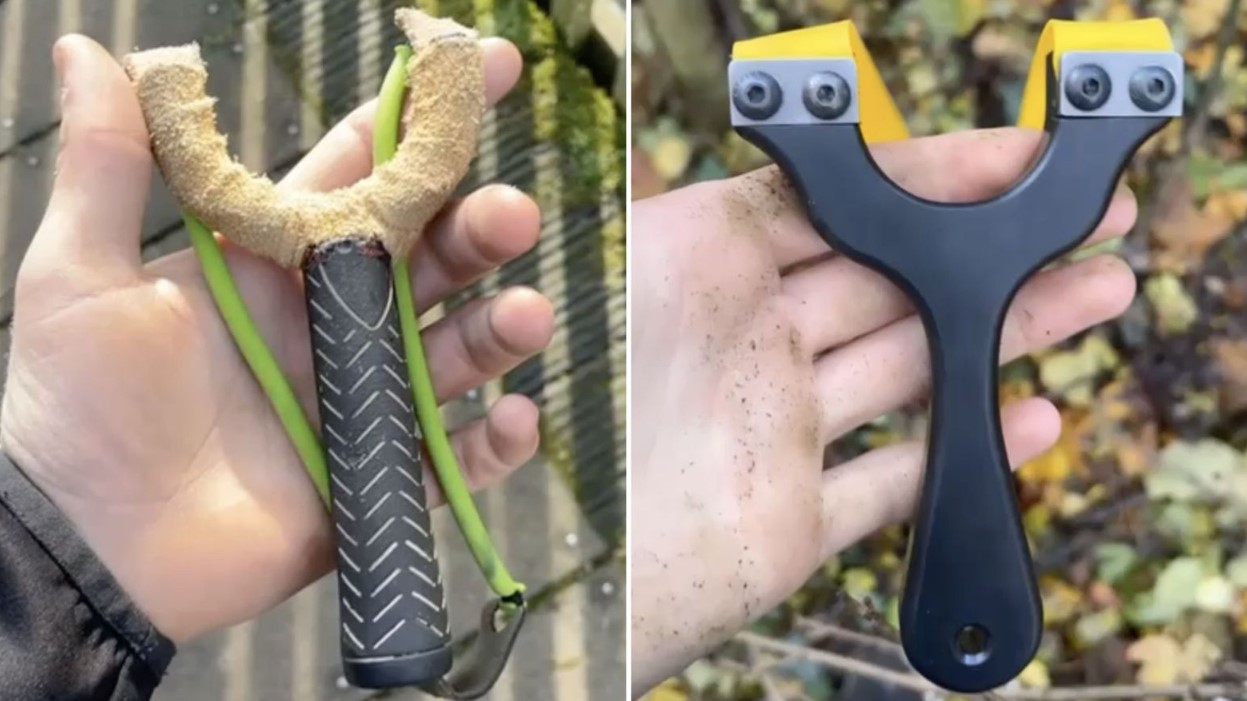Slingshots are simple yet versatile tools that have been used for centuries for hunting, recreation, and even self-defense. In Alabama, the legality of slingshots falls under relatively lenient weapon laws compared to some other states. This article explores whether slingshots are illegal in Alabama, the regulations surrounding their use, and the implications for residents and enthusiasts. Follow: self-defensetools.com!
1. Are Slingshots Legal in Alabama?
Yes, slingshots are legal in Alabama. The state does not classify slingshots as restricted or prohibited weapons under its laws. Residents are allowed to purchase, own, and use slingshots without needing a permit or license.
However, while slingshots themselves are legal, their use is subject to general laws governing public safety, property damage, and personal harm. Misusing a slingshot in a way that endangers others or causes damage may result in legal consequences.
2. Alabama’s Legal Framework for Slingshots
2.1. Alabama Penal Code
The Alabama Penal Code does not list slingshots as weapons requiring regulation. Unlike firearms or certain knives, slingshots are not subject to specific restrictions regarding their purchase, ownership, or transportation.
2.2. Local Ordinances
While there are no statewide bans or regulations on slingshots, individual municipalities in Alabama may have ordinances governing their use. For example:
- Public Spaces: Discharging a slingshot in public parks, near schools, or in residential areas may be restricted to ensure safety.
- Noise and Nuisance Laws: Using a slingshot in a manner that creates excessive noise or disturbance could result in fines or warnings under local nuisance laws.
2.3. Federal Regulations
Slingshots are not regulated by federal firearm laws, but their import or use for unlawful purposes (such as harming protected wildlife) may fall under federal oversight.
3. Responsible Use of Slingshots
Although legal in Alabama, slingshots must be used responsibly to avoid accidents, injuries, or legal repercussions.
3.1. Safety Guidelines
- Always aim in a safe direction and ensure a clear backstop to prevent stray projectiles.
- Avoid using slingshots in crowded or public areas.
- Use appropriate projectiles, such as rubber or non-lethal materials, to minimize risk.
3.2. Legal Considerations
Using a slingshot to intentionally harm someone, damage property, or disturb wildlife could lead to charges such as:
- Vandalism: Damaging property with a slingshot.
- Assault: Causing injury to another person.
- Animal Cruelty: Harming animals without justification.
4. Slingshots for Hunting and Pest Control
In Alabama, slingshots are commonly used for small game hunting and pest control. However, users must comply with state hunting laws.
4.1. Hunting Regulations
The Alabama Department of Conservation and Natural Resources (ADCNR) oversees hunting laws in the state. While slingshots are not explicitly mentioned, general hunting regulations apply:
- Obtain the appropriate hunting licenses for game animals.
- Adhere to hunting seasons and bag limits.
- Use humane practices to minimize animal suffering.
4.2. Pest Control
Slingshots can be a useful tool for pest control on private property. However, ensure that any action taken complies with state and local animal protection laws.
5. How Alabama Compares to Other States
Alabama’s permissive stance on slingshots is similar to many states in the U.S., but contrasts with stricter regions like:
- New Jersey: Slingshots are classified as prohibited weapons unless specifically permitted.
- California: Certain types of slingshots, such as those with wrist braces, may be regulated.
- Massachusetts: Requires a license for slingshot ownership.
Alabama’s laws reflect the state’s broader support for personal freedoms and limited restrictions on tools like slingshots.

6. Legal Consequences of Misuse
While slingshots are legal in Alabama, improper use can lead to legal trouble. Common offenses and their consequences include:
6.1. Vandalism
- Penalties: Fines, restitution, or community service.
- Example: Using a slingshot to break windows or damage vehicles.
6.2. Assault
- Penalties: Misdemeanor or felony charges, depending on the severity of the injury caused.
- Example: Intentionally targeting another person with a slingshot.
6.3. Animal Cruelty
- Penalties: Significant fines, imprisonment, or bans on owning animals.
- Example: Harming or killing wildlife without proper authorization.
7. Tips for Using Slingshots in Alabama
To stay within the law and use slingshots responsibly, consider the following tips:
- Practice in Private Areas: Use slingshots on private property or designated ranges to avoid conflicts with local laws.
- Check Local Rules: Be aware of any city or county-specific ordinances regarding slingshot use.
- Educate Yourself: Understand Alabama’s hunting and wildlife protection laws if using slingshots for these purposes.
8. The Future of Slingshot Laws in Alabama
Currently, there are no indications of changes to slingshot laws in Alabama. However, incidents involving misuse could prompt local authorities or lawmakers to introduce regulations. Staying informed about updates to state or local laws is essential for compliance.
Conclusion
Slingshots are legal in Alabama, offering residents the freedom to use them for recreation, hunting, and pest control. However, this legality comes with the responsibility to use slingshots safely and ethically. Reckless use can lead to legal consequences, even in a state with lenient weapon laws.
By understanding Alabama’s regulations and practicing responsible use, slingshot enthusiasts can enjoy their hobby while staying compliant with the law.
Related Posts: Are Slingshots Illegal in Texas?









